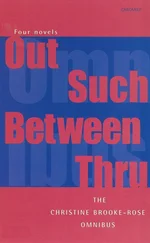Christine Brooke-Rose - Life, End of
Здесь есть возможность читать онлайн «Christine Brooke-Rose - Life, End of» весь текст электронной книги совершенно бесплатно (целиком полную версию без сокращений). В некоторых случаях можно слушать аудио, скачать через торрент в формате fb2 и присутствует краткое содержание. Год выпуска: 2012, ISBN: 2012, Издательство: Carcanet Press Ltd., Жанр: Современная проза, на английском языке. Описание произведения, (предисловие) а так же отзывы посетителей доступны на портале библиотеки ЛибКат.
- Название:Life, End of
- Автор:
- Издательство:Carcanet Press Ltd.
- Жанр:
- Год:2012
- ISBN:9781847775726
- Рейтинг книги:5 / 5. Голосов: 1
-
Избранное:Добавить в избранное
- Отзывы:
-
Ваша оценка:
- 100
- 1
- 2
- 3
- 4
- 5
Life, End of: краткое содержание, описание и аннотация
Предлагаем к чтению аннотацию, описание, краткое содержание или предисловие (зависит от того, что написал сам автор книги «Life, End of»). Если вы не нашли необходимую информацию о книге — напишите в комментариях, мы постараемся отыскать её.
by a master of experimental novels finds the author reflecting on her old age and its effects on her writing. As she reflects on her own career, her experiments with narrative, and on the narrative she writes here, she ultimately reasserts herself and accepts the life behind her.
Life, End of — читать онлайн бесплатно полную книгу (весь текст) целиком
Ниже представлен текст книги, разбитый по страницам. Система сохранения места последней прочитанной страницы, позволяет с удобством читать онлайн бесплатно книгу «Life, End of», без необходимости каждый раз заново искать на чём Вы остановились. Поставьте закладку, и сможете в любой момент перейти на страницу, на которой закончили чтение.
Интервал:
Закладка:
Oh I don’t know. Perhaps because everyone’s writing about the decline of France at the moment. I was brought up on several declines of Poland, what with three Partitions and two Occupations. But I don’t get the impression that the Polish language is dying, only changing, like any other. With French, I also always felt that a language spoken so far and wide isn’t likely to die soon. Look at Latin, which changed into many languages, and how long it took. But in Europe French is going down. I heard the other day that German is the most spoken language in Europe.
That’s astonishing.
Well, if you include Austria, half of Switzerland, the Italian Tyrol and other corners. But language is the only truly democratic institution in the world, French and Spanish and Italian and so on are strictly speaking bad Latin. The people always win, not the academicians.
Are you sure?
No, you’re right, they don’t. Not if the language is truly dying. Look at the Gauls, they lost out. There are very few Gallic words surviving in French. History books present it all as Latin civilisation winning over barbarians. But someone said, George Steiner I think, that it’s no longer a question of good manners, culture can’t defeat barbarism now. Inversely the Germanic conquerors, the Franks and Burgundians and Lombards and Goths, lost out to Latin and Italian and Spanish and early French, though Frankish gave its name to the later country.
Are you saying that the people always win but not if the language is dying instead of thriving?
You mean they always win except when they don’t? I don’t know, I’m tipsy.
Why are you so worried, Bożena? Is it personal? Have some more blanquette.
Thank you, it’s very good. How do you get that special taste?
By simplifying. A large onion pricked with cloves, baked with the veal in white wine, thickened to a sauce with beurre manié at the last moment. But the veal must be blanched first. Let me fill up your glass.
No please, I’ll get even tipsier.
So, is it personal?
Oh, I don’t know. Personal in the sense that, like you, I belong nowhere but have deep roots everywhere. I mean through the languages I know. Trilingual and quadrilingual people like that sometimes seem the answer to all nationalisms, a healthy sort of non-belonging, or non-passion anyway. But I’m not sure now. I used to think that highly inflected languages were the strongest. Now I wonder, as I watch and listen. Polish for instance has kept seven of the original eight Indo-European case-endings, Latin got that down to six, German to four, Old French to two then none. For they’re not necessary, as proved by some of the Germanic languages incuding English, who’ve done away with them. No gender, no conjugations, no inflexions! I know because I’ve been learning English, at my age! And once past the phonetic nightmare –
Due to antiquated spelling, like French.
You know, the French are constantly complaining about how English has replaced French as lingua franca for reasons of pure power, they say, not elegance or culture.
Latin had those, yet Latin died.
Exactly. They can’t forget that the lingua franca was once theirs, two centuries ago. Linguistic conservatism can also be a very strong cause of death. All the grammatically heavy languages are harder to learn, as you know from German and having learnt Polish as an adult.
And forgotten it as you also know.
And those two, with French, are my three languages. French dropped the declensions but kept conjugations and the repetitive grammatical links. You know, l’accord . The plural or the gender redundantly repeated five times in a five-word sentence. I’m exaggerating a bit of course but not much.
I see. Back to gender.
What I mean, they’re all three harder to learn for international conferences and scientific papers and such. Nuances are bound to be blurred in translation. And the more countries join the more cumbersome that is. So one instrumental language should be learnt by all, and is. It happens to be English now, later it could be Chinese or Arabic. Though they’re pretty complex too. Or Welsh, who knows? And while most of the countries have long accepted this, learning English very young, so speaking it very well, France is furious. And very much behind. Since English is crude and impoverished, they say.
That of course, is just méchant . Look at any French-English dictionary, it’s half or one third narrower than the English-French. Why? Because English has always taken in foreign loan-words including many French, while French always tends to return to Latin or Greek for new concepts and objects. Look at all the new scientific words in English, well, mostly from America, many of them very funny. Besides, English is often more concise. Look at any instructions in five or six languages, French is always the longest. More precise perhaps, as they suppose, but taking much longer to be precise. So it’s also hard to learn.
What a patriotic outburst! See what I mean! We’re both non-belongers but know more than average people about our several languages and countries. So that can raise bristles. But I wasn’t thinking of language in general, only of the international one, Ingloid if you like, which is impoverished, into pure politico-admin jargon. And any replacing language would go the same way.
Strawberries now, early, from Spain. I have mine with black pepper instead of sugar, it brings out their special taste much more sharply. Like to try?
Silence as she tries.
She is quite unlike anyone ever met. Even quite unlike any Pole ever met. Our friendship starts in Paris. Trilingual in Polish, German and French, she first teaches German at the Goethe Institut in Paris, but fairly soon goes off to teach in Africa, at fifty-five, in Togo and later Burundi. So she is seldom in her flat. But sometimes that’s the best way for True Friendship to start. She lends her flat to a Cameroonian medical student, and, when there, she sleeps in the tiny store-room. Whether there or not her flat is always full of Africans, and when emergencies coincide with vacations the top flat is also offered.
No damage ever. Neither, for that matter, when the flat is lent, for temporary relief at night, to the two little girls of the Portuguese concierge, who lives in one tiny room with them and her husband. Nor to a girl student from Germany. Nor when rented to a young American neurologist researching at La Salpètrière. That must mean something: the only careful American tenant a neurologist. Unlike later rentals to American scholars, couples or single, all literary: the piano-top ruined by wet whisky glasses, the fridge ruined by food left in it after switching off the electricity as asked, bathmats ruined by acid or is it pee, heritage apostle spoons lost down the garbage, infinite breakages and vital books borrowed for good. As in the occupation of Germany. Every time. So charming at home, so careless abroad. The world is now their oyster. If only they could learn from the bad British example how to behave when top nation. The Portuguese concierge, however, is amazed and a friend for ever.
And strangely, both flats are sold at the same time twenty years later, each retiring their separate ways, but keeping in touch, visiting in Paris or down here.
That was real strawberry, you’re right. Let me help you clear away.
Thank you. Shall we have coffee on the terrace? We can always come in if it’s too chilly. There’s a mistral building up, look at those two cypresses getting ready to dance. So you believe all growth happens through loss?
Well yes. Sometimes so slowly nobody notices except experts. Occupations vanish, so do political ideas, clothes, inventions, subjects taught. But the rate seems much faster today, so that we do notice it and feel fear, or rush blindly for the latest. Unless it’s just our age. Old people are supposed automatically to disapprove of language changes. Or any changes.
Читать дальшеИнтервал:
Закладка:
Похожие книги на «Life, End of»
Представляем Вашему вниманию похожие книги на «Life, End of» списком для выбора. Мы отобрали схожую по названию и смыслу литературу в надежде предоставить читателям больше вариантов отыскать новые, интересные, ещё непрочитанные произведения.
Обсуждение, отзывы о книге «Life, End of» и просто собственные мнения читателей. Оставьте ваши комментарии, напишите, что Вы думаете о произведении, его смысле или главных героях. Укажите что конкретно понравилось, а что нет, и почему Вы так считаете.












